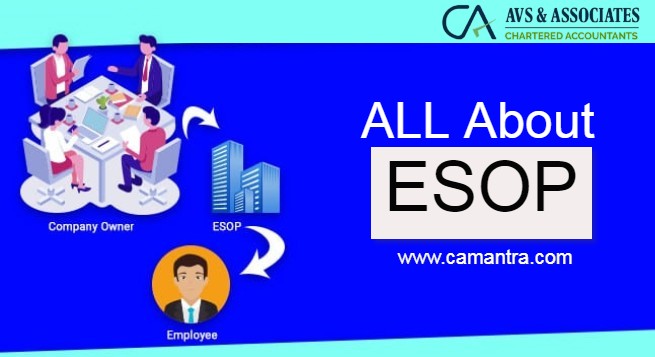ESOPs is a short form of Employee Stock Ownership Plans which gives workers ownership interest in the company. ESOP is a system under which generally the employees are given a right to get shares of the Company for which they are working.
ESOP is a program that provides shares or ownership interest to a company’s staff in the company. Under the program, the employees of a company are allowed to purchase some shares of the company for free or at concessional rates.
According to the provisions of section 2(37) of the Companies Act, 2013, “employees’ stock option” means – the option given to the directors/officers or employees of a company or of its holding company if any, which gives their directors/ officers/ employees, right to purchase or subscribe the shares of the company on a future date at a predefined cost.
There are two types of ESOPs:-
Selective plans –In this plan, the facility of owning some shares of the company is made available only to senior executives.
All employee plans –In this plan the facility of acquiring some shares of the company is made available to all employees of the company.
Employee Stock Ownership Plan is counted as a benefit scheme for the employees. However, the company or organisation puts stipulation on the employee, like a particular amount of time of service, to receive the benefit of buying shares.
What are the Benefits of ESOP for employees?
- It is counted as motivational factor for employees. If the company does well, the price of stock would rise, and it will benefit the employees. This could keep employees motivated and engaged in better performing.
- Employees can enhance their wealth much faster than when they are earning just a normal salary.
- Employees can purchase the shares at a nominal rate and sell them when the price of stock become higher.
Why Company offers ESOPs to their employees?
Organizations often use ESOP as a tool for attracting high-quality and experienced employees. Organizations generally distribute the stocks in a phased manner. For example, a company might grant stock to their employees at the close of the financial year, thereby offering their employees an incentive for remaining with the organization for receiving that grant.
Companies offering ESOPs have long-term objectives. Not only companies want to retain employees for a long-term, but also intend making them the stakeholders of their company. Most of the IT companies having alarming attrition rates, and ESOPs could help them lay down such heavy attrition Start-ups offer stocks for attracting talent. Often such organizations are cash-strapped and are unable to offer better salaries. But through offering a stake in their organization, they make their compensation package competitive.
Who Can Issue ESOP Under Law?
- A permanent employee of the Company who is working in India or Abroad or
- A director of the company but not to an independent
- Holding or associate company’s permanent employee. (Flows upwards. Downwards is not allowed)
Who is Not Eligible for ESOP?
- Promoters
- Any shareholder who is holding more than 10% either directly or indirectly.
How Does Taxation Work in ESOP?
- Treated as perquisite in the hands of employee.
- Employer needs to deduct TDS.
- Perquisite value is the difference between fair market price and exercise price.
- When the employee sells, it will be taxed under capital gains. Presently only short-term capital gains are taxed at 15% and short term is defined as 12 months.

